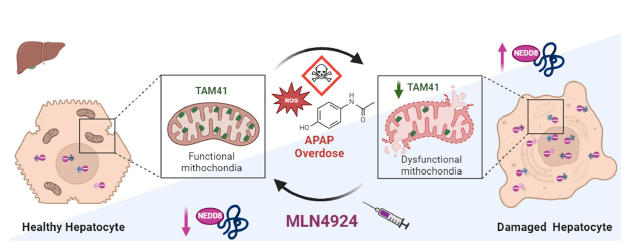
2024/07/22
New discovery for treating Acetaminophen-induced liver damage from overdose
Acetaminophen-induced liver damage is a major health issue, causing nearly half of acute liver failure cases and numerous fatalities and hospitalizations annually.
The study, recently published in Cell Reports Medicine, has uncovered a new treatment for liver damage caused by acetaminophen (APAP) overdose, potentially eliminating the need for liver transplants in severe cases.
A collaborative international study from the Liver Disease Laboratory, led by Dr. Malu Martínez-Chantar and Dr. Irene Gonzalez Recio at CIC bioGUNE – member of BRTA – and CIBEREHD, has made a groundbreaking discovery in the treatment of liver damage caused by an overdose of acetaminophen (APAP), commonly known as paracetamol.
The study, recently published in Cell Reports Medicine, was conducted with first authors Clàudia Gil-Pitarch and Marina Serrano-Maciá and could pave the way for new treatments that may prevent the need for liver transplants in severe cases.
In the Western world, liver damage from medications, particularly acetaminophen, is a major health problem. Acetaminophen overdose is the leading cause of acute liver failure in the United States, accounting for nearly half of all cases. It is also a significant cause in Europe, leading to hundreds of deaths and thousands of emergency room visits and hospitalizations annually in the U.S.
Currently, the only approved treatment for acetaminophen overdose is N-acetylcysteine (NAC), which is only effective if administered early. In severe cases, liver transplantation is often the only life-saving option, highlighting the urgent need for better treatments.
Researchers at CIC bioGUNE have focused on a bodily process called neddylation, which modifies certain proteins and affects cell function, including their ability to handle stress and damage. The team discovered that neddylation activity increases in patients with liver damage from acetaminophen.
By using a drug called MLN4924 to block neddylation in animal models, researchers significantly reduced liver damage and improved liver regeneration. This suggests that inhibiting neddylation could be a powerful new approach to treating acetaminophen-induced liver damage.
Further studies revealed that blocking neddylation increases levels of cardiolipin, a molecule crucial for healthy mitochondria (the cell's powerhouses), helping protect liver cells from damage and promoting healing.
These promising findings represent a significant step toward developing new treatments that could save lives and reduce the need for liver transplants in patients suffering from severe acetaminophen-induced liver damage.
Reference: Clàudia Gil-Pitarch, Marina Serrano-Maciá, Jorge Simon, Laura Mosca, Carolina Conter, Claudia M. Rejano-Gordillo, L. Estefanía Zapata-Pavas, Patricia Peña-Sanfélix, Mikel Azkargorta, Rubén Rodríguez-Agudo, Sofía Lachiondo-Ortega, Maria Mercado-Gómez, Teresa C. Delgado, Marina Porcelli, Igor Aurrekoetxea, James D. Sutherland, Rosa Barrio, Dimitris Xirodimas, Patricia Aspichueta, Felix Elortza, María L. Martínez-Chantar. Neddylation inhibition prevents acetaminophen-induced liver damage by enhancing the anabolic cardiolipin pathway. Cell Reports Medicine. DOI: 10.1016/j.xcrm.2024.101653.
About CIC bioGUNE
The Centre for Cooperative Research in Biosciences (CIC bioGUNE), member of the Basque Research & Technology Alliance (BRTA), located in the Bizkaia Technology Park, is a biomedical research organisation conducting cutting-edge research at the interface between structural, molecular and cell biology, with a particular focus on generating knowledge on the molecular bases of disease, for use in the development of new diagnostic methods and advanced therapies.
About BRTA
BRTA is an alliance of 4 collaborative research centres (CIC bioGUNE, CIC nanoGUNE, CIC biomaGUNE y CIC energiGUNE) and 13 technology centres (Azterlan, Azti, Ceit, Cidetec, Gaiker, Ideko, Ikerlan, Leartiker, Lortek, Neiker, Tecnalia, Tekniker y Vicomtech) with the main objective of developing advanced technological solutions for the Basque corporate fabric.
With the support of the Basque Government, the SPRI Group and the Provincial Councils of the three territories, the alliance seeks to promote collaboration between the research centres, strengthen the conditions to generate and transfer knowledge to companies, contributing to their competitiveness and outspreading the Basque scientific-technological capacity abroad.
BRTA has a workforce of 3,500 professionals, executes 22% of the Basque Country's R&D investment, registers an annual turnover of more than 300 million euros and generates 100 European and international patents per year.
See a large version of the first picture





